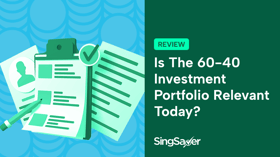Ever wondered what being financially stable in Singapore looks like? These 6 signs let you know if you’re on the right track.
In a fast-paced, high-priced city like Singapore, what does it mean to be financially stable?
Is it enough to have a job, and occasionally buy yourself a treat? Or does financial stability require having disposable income to spend anyway you like?
What about future needs, such as retirement and even leaving behind something for the next generation?
Financial stability means different things to different people, sure, but there are some common signs that we can look for.
Start managing and saving money like a pro with SingSaver’s weekly financial roundups! We dole out easy-to-follow money-saving tips, the latest financial trends and the hottest promotions every week, right into your inbox. This is one mailer you don’t want to miss.
Sign up today to receive our exclusive free investing guide for beginners!
1. You pay your bills promptly
Paying your bills has become so common and entrenched in everyday life that many fail to notice how it can tell us how financially stable we are.
At its most basic, financial stability means being able to pay your bills promptly. They come in, you pay them off, and the cycle repeats monthly. For those who are financially stable, bills are just simply something to deal with and move on.
In contrast, if you don’t have the funds to pay your bills on time, you’ll dread opening the letterbox or clicking on that reminder email.
You may find yourself hesitant to settle your bills - even if you have the money - and drag your feet till the last possible moment, risking late fees while juggling multiple due dates in your head.
If this is happening, that’s a sure sign you are not financially stable yet. Try cutting back on your spending, or - even better - increase your income so that paying your bills becomes less of a problem.
2. You use credit cards because you want to, not because you have to
Credit cards are a convenient, safe and versatile way to pay for your purchases. But how you use them could reveal the truth about your degree of financial stability.
Using your credit card because you want to earn cashback, points or air miles on your purchase is all well and good. You’re entitled to those perks as a cardholder, so go ahead and enjoy them.
But, using your credit card because you have no more money and payday is still a week away, is something different altogether.
When this happens, it’s telling you there is a shortfall in your finances. Which also means that your financial stability is in a fragile state, as you may just be a financial emergency away from falling into debt.
To be clear, using your credit card to pay for essentials you need, such as appliances, or a new laptop for WFH, is okay.
However, you need to do so prudently, such as by using an interest-free instalment payment plan that you can comfortably pay off every month.
3. Your insurance portfolio is up to date
Another sign that you are financially stable is that you have an insurance portfolio that is current and complete.
A major driver of financial stability is the desire to take care of our loved ones, no matter what may come.
Insurance can help ensure your family continues to have their needs met should an accident or illness render you unable to provide for them any longer.
Those striving for financial stability understand the importance of having an insurance portfolio that contains the right policies and offers appropriate levels of benefits.
So, if you’ve been regularly meeting your financial adviser to review and update your insurance portfolio, you’ve achieved a significant degree of financial stability.
Safeguard your health with one of our cancer insurance.
4. You can take a sabbatical from work if you really want to
If you woke up tomorrow and decided you wanted to take a few months break from work to focus on a passion or hobby, could you? More specifically, would your bank account allow it?
Having enough money in the bank to go several weeks or months without needing an income is a sure sign that you’re financially stable. Not only have you been able to keep up with your financial commitments, you’ve managed to sock away a tidy stack of cash along the way.
More importantly, if your reserves are actually large enough to cover a few months’ worth of living expenses, you’re probably very close to - or even surpassed - that legendary 6-month emergency fund.
Better yet, if you’ve managed to get started on building a passive income portfolio, you’ll stand to gain the rewards of compounding.
Check out our online brokerages to get the best rates for your investing needs.
5. Your net worth increases year by year
Having extra funds to stash away each month is not just a nice way to have a safety cushion.
It is also how you increase your net worth year after year, which is another sign that you are financially stable, or at least on the right track towards it.
Putting money every month into stocks and shares, property or even cryptocurrencies (only proper ones, please) can help you to increase your wealth.
Over time, your initial investment can grow beyond your expectations, especially if you join a privileged banking programme to receive the right market insights and investment advice.
So, if the total value of all the assets you own has been climbing year after year, well done, you’re very likely to be more financially stable compared to your peers.
6. You find yourself thinking about estate planning
Finally, if planning how to leave your assets to your children is making you realise you need an estate planning firm, congratulations!
That is perhaps the biggest sign you and your family are financially stable in Singapore (and then some!)
You’re playing in the big league now, and while that means it’s necessary to set up a proper will and appoint an executor, you don’t have to take it all on by yourself.
Consider consulting a professional estate planner to help you avoid pitfalls while preserving and enhancing your legacy for future generations.
You can normally find such services offered by wealth managers.
Open a priority banking account today to enjoy exclusive deals, banking services and a dedicated Relationship Manager to help you through your investment and financial needs.
Read these next:
Money Confessions: Top 5 Personal Finance Goals SS Staffers Aim To Check Off In 2022
7 Questions To Ask Yourself To Know If You’re Financially Ready To Buy A House
5 Singaporean Women Share How They Achieved Financial Independence
Financial Independence vs Financial Freedom: What Are You Looking For?
Similar articles
8 Sneaky Signs That Lifestyle Inflation Is Delaying Your Financial Freedom
Is It Time to Fire Your Financial Advisor? These 5 Signs Say Yes
How Much Do You Need to Feel Financially Free?
How To Calculate Your Net Worth In Singapore?
Why I Do A Yearly Financial Review (And So Should You!)
7 Golden Rules to Managing Your Money Like An Adult
7 Signs You’re On the Right Track to Financial Success at 25
6 Signs You Need an Insurance Rider For Your Insurance Plan











